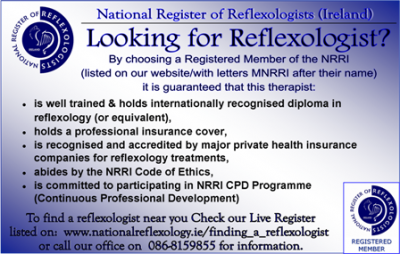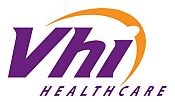LOOKING FOR REFLEXOLOGIST? >>CLICK HERE>>
THE AGEING OF THE FOOT
by Health Promotion Unit Department of Health and Children
The Foot
Each foot is a complex structure. It consists of 26 bones, with ligaments and tendons, blood vessels and nerves. Healthy
feet are essential to help us stay active and mobile. Good foot care is
essential for healthy feet. Try to have routine of caring for your
feet.
As we get older, foot problems, are often related to our
general health. Arthritis, circulatory and neurological diseases and
diabetes often affect the feet. But many problems can be avoided by a
little regular care and attention.
Cleanliness
- Wash your feet every day in warm, soapy water. Never soak them.
- Rinse your feet with clean water.
- Gently pat your feet dry. Never rub in between toes.
- Gently rub in a small amount of moisturizing cream (lanolin or other emollient). Don't use dusting powder.
Nail Cutting
- Cut your nails regularly.
- Use a proper nail clipper.
- Cut the nails straight across and not too short.
- Never cut down the sides into the nail grove.
To remove dirt from the side of the nail use a soft nail brush. A tooth brush might be easier to use because of the long handle. Use an emery board or file to reduce a thickened nail.If you find your nails too difficult to cut, visit your chiropodist or public health nurse.
Heat and Cold
In winter you need to keep your feet warm. Sometimes you may not realize your feet are cold.
- Wear loose fitting woolen socks.
- Keep your room warm.
- Keep active, walk and take exercise.
- If you get your feet wet, wash them in warm water and dry them carefully as soon as possible.
- Remove hot water bottles from your bed before getting in.
As we get older our blood does not circulate as well in our bodies. Hands and feet can be particularly affected.
To help your circulation:
- Put your feet and legs up on a stool or other chair when sitting.
- Don't cross your legs.
- Don't sit too close to fires or heaters.
Badly fitting socks and stockings can be harmful. Make sure that elastic stockings are properly designed and fitted to suit you. Ask your public health nurse, family doctor or chemist for advice. Never wear garters.
Footwear
Wear good fitting laced up shoes with soft uppers. Soft rubber soles will also be more comfortable. Have your feet measured when buying shoes. Only wear slippers for short periods. Remember, expensive footwear is not necessarily good footwear.
Professional Care
Good foot care may not always stop problems happening. If you have problems with your feet speak with your family doctor or chiropodist. Never treat corns or painful nails yourself. Look for advice early and as often as you need it.
Helpful Services
You can find out about chiropody services from your local health board or public health nurse. Some services may be free to eligible persons.
Originally Published by the
HEALTH PROMOTION UNIT
Department of Health & Children,
Tel. (01) 6354000
www.healthpromotion.ie
You can find out about chiropody services from your local health board or public health nurse. Some services may be free to eligible persons.


 Our Objectives
Our Objectives CPD Programme
CPD Programme




